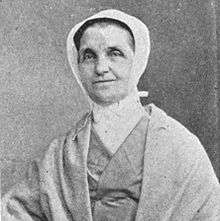Mary Whitcher

Mary Whitcher (March 31, 1815 – January 6, 1890) was an American Shaker trustee, school teacher, and author at the Canterbury Shaker Village in the United States.
Early life
Whitcher was born on March 31, 1815 in Laurens, New York.[1] She was the youngest of four children,[1] with a brother and two sisters.[2] When Whitcher was eleven years old her family moved to the Canterbury Shaker Village in New Hampshire.[1] The site of the Canterbury community was the old homestead of Mary's grandfather, Benjamin Whitcher, who in 1782 dedicated his 100-acre (40 ha) farm to the Society as a basis and the nucleus for the people of the newly formed Shaker community.[3]
Mid life
Whitcher became officially a part of the Canterbury Shakers in 1826.[4] In time she ultimately became a trustee, family eldress, and schoolteacher of the community.[4] She also served as a kitchen deaconess.[5] According to The Farmer's Monthly Visitor agriculture journal in 1839 Whitcher is 25 years old and a schoolteacher instructing the girls of the Canterbury Shakers.[2] She was a trustee in the Canterbury Society for some 20 years and became recognized as an ideal Shakeress.[1]
Mature life
Whitcher became an active leader in the Ministry of the Shakers. This was composed of two male members and two female members. It presided over the two Societies of Canterbury and Enfield. It was the highest office in the Society.[1]
Death
Whitcher died on January 6, 1890. Her exact age is recorded by The Manifesto published by the Shakers in the obituary section as 74 years, 9 months, and 6 days.[6]
Works
Whitcher often contributed to the Shaker literature with poems. Historian Robinson says she could have been referred to as the Shaker poetess because of her poetic work.[1] Some example titles are "The Snow Storm", "First Morning Thought",
and this one titled "Assurance":
"Who hath a God, hath all the world beside
In which to live and move and to abide;
But he who trusteth not to power divine,
Doth well distrust beyond the scenes of time."[1]
- ^ Robinson 1893, pp. 113–114.
Cookbook
Whitcher was well recognized nationally for her 34-page booklet titled Mary Whitcher's House-Keeper that has a drawing of her on the cover.[4] It promoted Shaker medicines, cooking, and philosophy.[7] Her booklet is the first Shaker cookbook published.[5][8][9] It was originally printed in Boston in 1882 and also gives a short history of the Shakers.[10] Whitcher designed a cookbook that had a basic economical meal for each day of the week that was different. This was a novelty for most of the New England homes of the nineteenth century. Many of the recipes she obtained from her friends. She hoped that the readers would use the daily recipes as a basis for more elaborate meals. The first meal was on Sunday and the last on Saturday. After this she gave many miscellaneous recipes including several deserts and credited many to whom she obtained the recipe or desert from. Whitcher brings up some pointers of etiquette for the dinner table at the very end of her cookbook.[11]
See also
- Millennial Praises, was the first Shaker hymn book published.[12]
- Thomas Corbett (Shaker doctor), whose medicines Whitcher promoted[13]
References
Notes
Citations
- 1 2 3 4 5 6 Robinson 1893, pp. 113–114.
- 1 2 "The accomplished school-mistress and her family". The Farmer's Monthly Visitor. Wm. P. Foster. 1–2: 115. 1839. Retrieved 22 June 2015.
- ↑ Paterwic 2008, p. 30.
- 1 2 3 Paterwic 2009, p. 237.
- 1 2 Miller 1999, p. 87.
- ↑ "Deaths". The Manifesto. United Societies, Shakers. 20–23: 46. 1890. Retrieved 23 June 2015.
- ↑ Whitcher 1882, pp. 2–32.
- ↑ Weatherford 2004, p. 39.
- ↑ Sprigg 1998, p. 42.
- ↑ Whitcher 1882, p. 1.
- ↑ Whitcher 1882, p. 1–32.
- ↑ Miller 2003, p. 41.
- ↑ Whitcher 1882, p. 5.
Sources
- Miller, Amy Bess Williams (1999). Shaker Medicinal Herbs: A Compendium of History, Lore, and Uses. Storey Books. ISBN 1-58017-040-4.
- Miller, Page Putnam (2003). Landmarks of American Women's History. Oxford University Press. ISBN 0-19-514501-1.
- Paterwic, Stephen J. (2008). Historical Dictionary of the Shakers. Scarecrow Press. ISBN 0-8108-6255-7.
- Paterwic, Stephen J. (2009). The A to Z of the Shakers. Scarecrow Press. ISBN 0-8108-7056-8.
- Robinson, Charles Edson (1893). A Concise History of the United Society of Believers Called Shakers. Robinson.
- Sprigg, June (1998). Simple Gifts: A Memoir of a Shaker Village. Alfred A. Knopf. ISBN 0-679-45504-3.
- Weatherford, Doris (2004). A history of women in the United States. Grolier Academic Reference. ISBN 0-7172-5805-X.
- Whitcher, Mary (1882). Mary Whitcher's Shaker house-keeper Mary Whitcher's Shaker house-keeper Check
|url=value (help). Weeks & Potter.